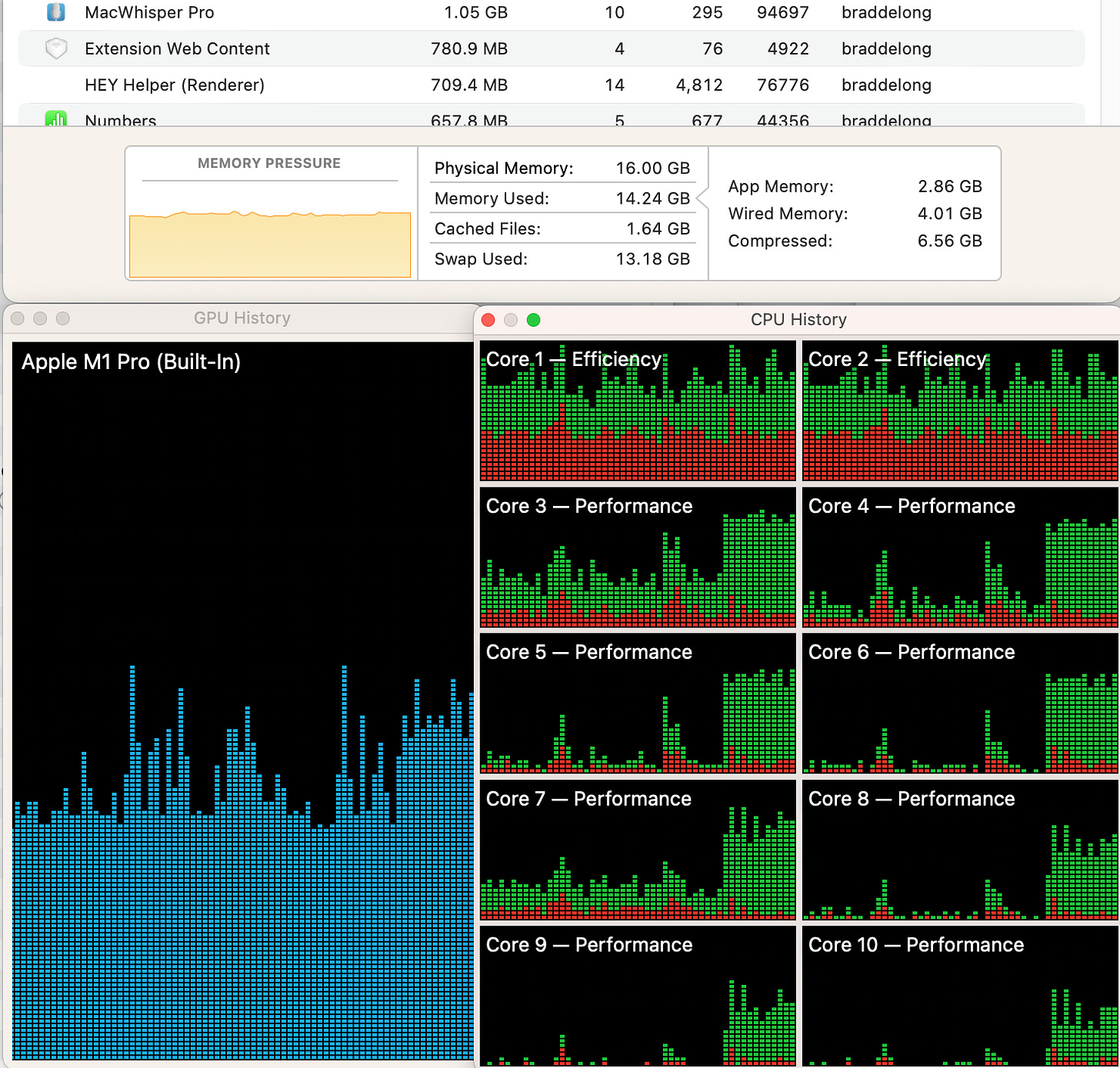Utopia or Bust?, & BRIEFLY NOTED: For 2023-02-03 Fr
Project Syndicate column, finally using this microprocessor, Joshua Rothman on the Upper-Lower South slave trade, Krugman, Wolf, Duy, Rogoff, Brainard, Pueyo, Baldwin, Karpf, Harrison, Harrison...
FOCUS: Utopia or Bust? A Column for Project Syndicate:
Brad DeLong Utopia or Bust: The grand narrative of the long century between 1870 and 2010 was about technological triumph, coupled with social-organizational failure. Now, the politics of economic governance has gotten even messier, opening up the possibility that we will end up with the worst of all possible worlds.
BERKELEY – My book on the economic history of the twentieth century, published last fall, did not include a chapter on the question of the future or “what we should do next,” because my frequent co-author, Stephen S. Cohen, convinced me that whatever I wrote would come to look outdated and silly within six months. He was right: such arguments are better left to commentaries like this one. So, if I had written a final chapter looking to the future, what should I have said?
Prior to the phantom text, I argue that for most of history, humanity was too poor for political governance to be anything but elites ruling through force and fraud to amass wealth and resources for themselves. But in 1870, the rocket of modern economic growth blasted off, doubling humanity’s technological competence every generation thereafter. Suddenly, we seemed to have acquired the means to bake an economic pie large enough for everyone to have enough. If we could solve the second-order problems of how to distribute and consume the pie so that everyone felt safe, healthy, and happy, a kind of utopia would be within reach.
Yet something went wrong. Between 1870 and 2010, humanity did not gallop, run, canter, trot, or even walk toward utopia. At best, we slouched – and not even always in the right direction…
ONE IMAGE: MacBookPro Activity Monitor:
Finally! A program that gives the chip a workout, that does not leave me feeling like a fool for going for a machine with the M1Pro 10-16 CPU-GPU cores rather than the M1 8-8:
ONE AUDIO:
Eric Loomis: LGM Podcast: The Domestic Slave Trade: ‘Joshua Rothman, historian at the University of Alabama, about his recent book The Ledger and the Chain: How Domestic Slave Traders Shaped America…. Myths around the slave trade, the incredible cruelty of the practice and what this says about America then and now, the legacy of cruelty in America, the unwillingness of the nation to face up to its past, and what is like to teach these subjects in a blood red state. It’s a good one and you want to hear it, even though the subject matter is not always easy and fun…
<https://overcast.fm/+LdXFKyw50>
Very Briefly Noted:
Paul Krugman: Stagflation or soft landing?: ‘Various temporary factors are more or less a wash… underlying inflation really has come down a lot… there’s good reason to believe that we can restore price stability without huge economic pain…
Martin Wolf: When good economic news may not be good news: ‘The dilemma for central banks is whether today’s optimism is consistent with returning inflation rates to 2 per cent…
Tim Duy: Fed Watch, 1/31/23: ‘ECI came in on the soft side with deceleration in wages, benefits, and wages excluding compensation…
Kenneth Rogoff: Too Soon for Global Optimism: ‘The World Economic Forum… the jubilant mood of the CEOs… hard to reconcile… with the short-term and long-term economic uncertainty caused by the war in Ukraine…
Lael Brainard: Speech on the economic outlook…
Tomas Pueyo: How to Understand France…
Richard Baldwin: Digitech, the future of trade and export-led development …
¶s:
Dave Karpf: What are we going to do about Generative AI content farms?: ‘Digital journalism crisis circa 2009-2010… awash in low-quality content, produced for pennies by an army of freelancers employed by content farms… scooping basically all the money out of the online advertising ecosystem…. Google stepped in and rendered the whole situation inert…. Relying on platform monopolists to protect the public interest isn’t a great way to run a civilization, but it’s better than nothing. Looking at some of the emerging use-cases for ChatGPT, it seems likely to me that we’re about to take a trip back to 2009…. But this time, the platform monopolists might not perform the deus ex machina role. …In other words, I think we’re headed for a big mess…
Ed Harrison: ‘Don’t Fight the Fed’ Will Be Powell’s Message This Week: ‘When we polled investors last week, more than half agreed with DoubleLine Chief Investment Officer Jeffrey Gundlach that they’d rather watch the bond market than listen to what Fed officials are saying about the central bank’s path. Since the bond market is suggesting monetary policy will be a lot easier than officials are, we have a classic case of financial markets fighting the Fed. I expect Fed Chair Jerome Powell to push against that narrative tomorrow in his post-FOMC press conference…. The tricky part in all of this is the data…
John Harrison: Why Does It Feel Like Amazon Is Making Itself Worse?: ‘More products are junk. The interface itself is full of junk. The various systems on which customers depend (reviews, search results, recommendations) feel like junk. This is the state of the art of American e-commerce, a dominant force in the future of buying things. Why does it feel like Amazon is making itself worse? Maybe it’s slipping, showing its age, and settling into complacency. Or maybe — hear me out — everything is going according to plan…
Heather Cox Richardson: January 30, 2023: ‘Governing is a lot harder than talking about it. On December 30, House majority leader Steve Scalise (R-LA) promised that the House Republicans would “hit the ground running to do what we promised on the border, crime, energy, inflation, Life, taxpayer protection & more.” He outlined eleven bills the party would bring to the floor in the first two weeks…. Half have indeed been voted on… but… no one is trying to negotiate to pass them [in the Senate]. The other half aren’t on the [House] calendar…. Republicans have turned to investigations, abortion, threatening the national debt, and trying to defund the Internal Revenue Service rather than dealing with the issues they insisted were vital in 2022: crime and inflation…. More demonstrations for the extremist base appear to be coming…. The RNC suggests that the party did poorly in 2022 not because their stand was too strong but because it was too weak. Candidates were not clear enough about their opposition to abortion…
Michael McFaul: How to Get a Breakthrough in Ukraine: ‘As long as Russian soldiers occupy their country, Ukrainians will fight… with or without new advanced weapons…sanctions… money….. An obvious policy recommendation for the West: help Ukraine win as fast as possible. The best way to commemorate February 24, the anniversary of Putin’s invasion, is to make clear that this is the West’s strategy…. This is also the best way to avoid being in the same place when February 24, 2024, rolls around…
Ian Cuttress: What Will Intel Cut Next?: ‘Running a semiconductor fab (or lots of them)… is… capital-intensive.... Intel 7 is a very expensive process…. Investment in Intel 4, the actual commercialization of EUV…. During a downturn, and a lull in revenue, Intel is spending more on building more capacity…. Sapphire Rapids... at least two years late…. 1600mm2+ of silicon for 60 cores while AMD's Genoa is ~1000mm2 of silicon for 96 cores and beats Intel by a generation on a number of key workloads. Intel still wins in optimized AI, acceleration, and the key workloads that it has its army of engineers optimize for, but the question I'm continually asked by the wider market is if it is enough?... We've all heard the phrase 'go big or go home', well Gelsinger is going bigger than everyone else it seems…. It has to weather the storm…. The street didn't expect it to be this rough...









I just read that Thomas Moore was being ironic when he coined the term ‘utopia’ and that in Greek it means “Nowhere.”
Intel is rather sad. They did so well with their x86 architecture, selling to server farms and for high performance computing but ignoring the growing phone, tablet and laptop market. Ten years ago, they made impressive processors and had great manufacturing ability. Today, they have fallen behind. It's almost as if the company got taken over by MBAs.